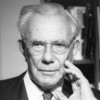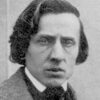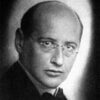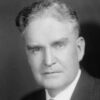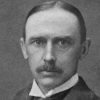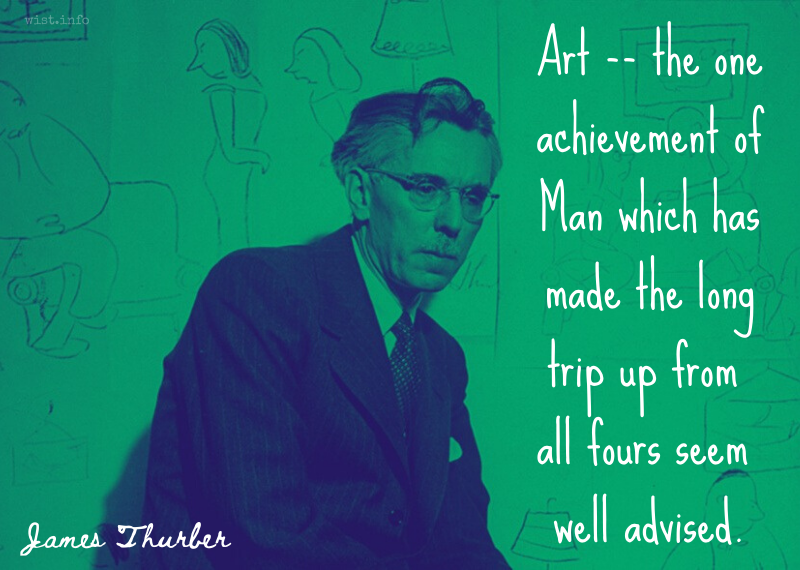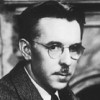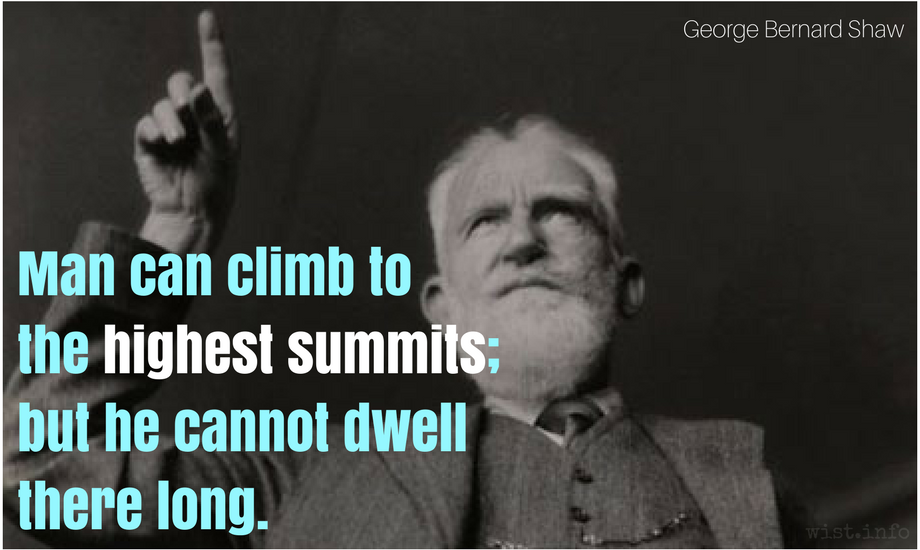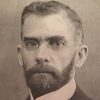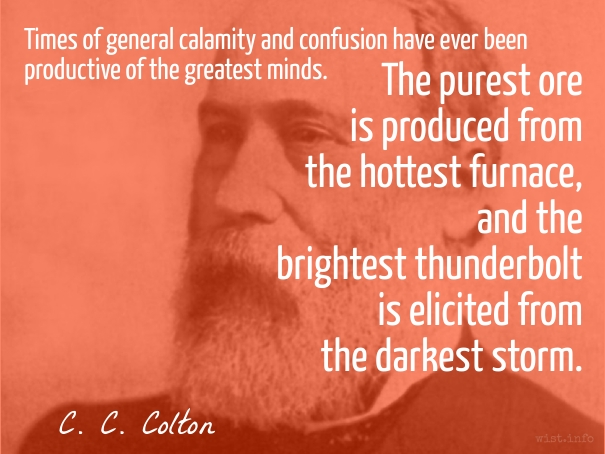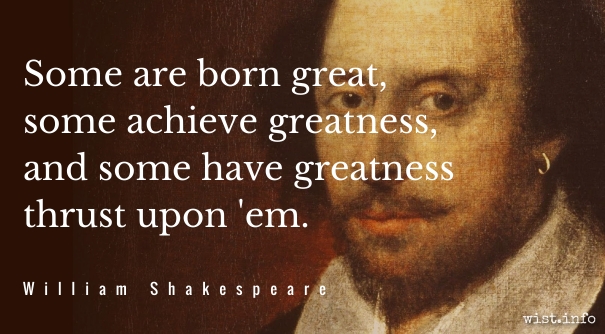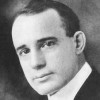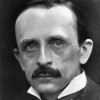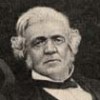If it came true, it wasn’t much of a dream.
Mignon McLaughlin (1913-1983) American journalist and author
The Neurotic’s Notebook, ch. 5 (1963)
(Source)
Quotations about:
achievement
Note not all quotations have been tagged, so Search may find additional quotes on this topic.
Getting what you go after is success; but liking it while you are getting it is happiness.
Bertha Damon (1881-1975) American humorist, author, lecturer, editor [Bertha Clark Pope Damon]
A Sense of Humus, ch. 13 “Garden Sass” (1943)
(Source)
COMMENDATION, n. The tribute that we pay to achievements that resemble, but do not equal, our own.
Ambrose Bierce (1842-1914?) American writer and journalist
“Commendation,” The Cynic’s Word Book (1906)
(Source)
Included in The Devil's Dictionary (1911). Originally published in the "Devil's Dictionary" column in the San Francisco Wasp (1881-08-05).
The awareness of the ambiguity of one’s highest achievements (as well as one’s deepest failures) is a definite symptom of maturity.
Paul Tillich (1886-1965) American theologian and philosopher
Quoted in Time (1963-05-17)
(Source)
Speech given at the 40th Anniversary Dinner for Time, reported in the following week's magazine.
Fortune sumtimes shows us the way, but it iz energy that achieves sucksess.
[Fortune sometimes shows us the way, but it is energy that achieves success.]
Josh Billings (1818-1885) American humorist, aphorist [pseud. of Henry Wheeler Shaw]
Everybody’s Friend, Or; Josh Billing’s Encyclopedia and Proverbial Philosophy of Wit and Humor, ch. 131 “Affurisms: Plum Pits (1)” (1874)
(Source)
Art followed hard on art. Toil triumphed over every obstacle, unrelenting Toil, and Want that pinches when life is hard.
[Tum variae venere artes. Labor omnia vicit
inprobus et duris urgens in rebus egestas.]Virgil (70-19 BC) Roman poet [b. Publius Vergilius Maro; also Vergil]
Georgics [Georgica], Book 1, l. 145ff (1.145) (29 BC) [tr. Fairclough (Loeb) (1916)]
(Source)
On humanity developing the arts and sciences in response to Jove making life difficult.
Compare this to Labor omnia vincit ("Work conquers all"), Oklahoma's state motto.
(Source (Latin)). Alternate translations:
Then came strange arts, fierce labor all subdues.
Inforc'd by bold Necessity, and Want.
[tr. Ogilby (1649)]
And various Arts in order did succeed,
(What cannot endless Labour urg'd by need?)
[tr. Dryden (1709), ll. 217-218]
Thus by long labour arts to arts succeed,
Such is the force of all-compelling need.
[tr. Nevile (1767)]
Thus rous'd by varied wants new arts arose,
And strenuous Labour triumph'd at its close.
[tr. Sotheby (1800)]
Then various arts ensued. Incessant labour and want, in hardships pressing, surmounted every obstacle.
[tr. Davidson (1854)]
Then came the various arts: oh, grand success
Of reckless toil and resolute distress!
[tr. Blackmore (1871)]
Then came the various arts of life. So toil, relentless toil, and the pressure of want in adversity, conquered the world. [tr. Wilkins (1873)]
Then divers arts arose; toil conquered all,
Remorseless toil, and poverty's shrewd push
In times of hardship.
[tr. Rhoades (1881)]
Thus stern Necessity inventive tried
Fresh arts, which life’s increasing wants supplied.
[tr. King (1882)]
Then various arts followed. Unwearying labor overcame every difficulty, and want spurring men on in times of hardship.
[tr. Bryce (1897)]
Then arts many in sort; nothing but yielded to unrelenting toil and the hard pressure of poverty.
[tr. Mackail (1899)]
Then divers arts arose; toil conquered all,
Remorseless toil, and poverty's shrewd push
In times of hardship.
[tr. Greenough (1900)]
Then followed manifold arts: unflinching toil ever one
Triumphs: in hardship's school stern need still drave men on.
[tr. Way (1912)]
Then later times
Brought forth of other arts the varied skill.
Work conquered all, relentless, obstinate,
While poverty and hardship urged it on.
[tr. Williams (1915)]
Then numerous arts arose. Yes, unremitting labour
And harsh necessity's hand will master anything.
[tr. Day-Lewis (1940)]
Then followed all the civilizing arts:
Hard labor conquered all, and pinching need.
[tr. Bovie (1956)]
Then all kinds of skills came into being. Toil has overcome all things, runious toil and need, pressing in harsh circumstances.
[tr. Miles (1980)]
And last the various arts.
Toil mastered everything, relentless toil
And the pressure of pinching poverty.
[tr. Wilkinson (1982)]
Then came the various arts. Hard labour conquered all,
and poverty’s oppression in harsh times.
[tr. Kline (2001)] https://www.poetryintranslation.com/PITBR/Latin/VirgilGeorgicsI.php#anchor_Toc533589845:~:text=then%20came%20the,in%20harsh%20times.
Then came the arts in many guises. Relentless work conquered
all difficulties -- work and urgent need when times were hard.
[tr. Lembke (2004)]
All this before the knowledge and know-how which ensued. Hard work prevailed, hard work and pressing poverty.
[tr. Fallon (2006)]
And then myriad arts. Toil subdued the earth, relentless toil, and the prick of dearth in hardship.
[tr. Johnson (2009)]
Then followed other arts; and everything
Was toil, relentless toil, urged on by need.
[tr. Ferry (2015)]
Blest is the man who cheats the stormy sea
And safely moors beside the sheltering quay;
So, blest is he who triumphs over trial.
One man, by various means, in wealth or strength
Outdoes his neighbour; hope in a thousand hearts
Colours a thousand different dreams; at length
Some find a dear fulfilment, some denial.
But this I say,
That he who best
Enjoys each passing day
Is truly blest.[εὐδαίμων μὲν ὃς ἐκ θαλάσσας
ἔφυγε χεῖμα, λιμένα δ᾽ ἔκιχεν:
εὐδαίμων δ᾽ ὃς ὕπερθε μόχθων
ἐγένεθ᾽: ἑτέρᾳ δ᾽ ἕτερος ἕτερον
ὄλβῳ καὶ δυνάμει παρῆλθεν.
μυρίαι δ᾽ ἔτι μυρίοις
εἰσὶν ἐλπίδες: αἳ μὲν
τελευτῶσιν ἐν ὄλβῳ
βροτοῖς, αἳ δ᾽ ἀπέβησαν:
τὸ δὲ κατ᾽ ἦμαρ ὅτῳ βίοτος
εὐδαίμων, μακαρίζω.]Euripides (485?-406? BC) Greek tragic dramatist
Bacchæ [Βάκχαι], l. 902ff (Stasimon 3, Epode) [Chorus/Χορός] (405 BC) [tr. Vellacott (1973)]
(Source)
(Source (Greek)). Alternate translations:
Blest is the man who 'scapes the stormy wave.
And in the harbour finds repose:
He too is blest, 'midst dangers brave,
Who soars above the malice of his foes:
And now these, now those possess
Superior talents or success;
Distinct their aims; but hope each bosom fires.
There are, a rich encrease who find,
The vows of some are scatter'd in the wind:
But in my judgement blest are they
Who taste, tho' only for the day.
The joys their soul desires.
[tr. Wodhull (1809)]
Happy is he who has fled a storm on the sea, and reached harbor. Happy too is he who has overcome his hardships. One surpass another in different ways, in wealth or power. There are innumerable hopes to innumerable men, and some result in wealth to mortals, while others fail. But I call him blessed whose life is happy day today.
[tr. Buckley (1850)]
Who hath 'scaped the turbulent sea,
And reached the haven, happy he!
Happy he whose toils are o'er
In the race of wealth and power!
This one her, and that one there,
Passes by, and everywhere
Still expectant thousands over
Thousands hopes are seen to hover,
Some to mortals end in bliss;
Some have already fled away:
Happiness alone is his
That happy is to-day.
[tr. Milman (1865)]
Happy he, who from the storm,
Has the breaker escaped, and the harbour has reached;
Happy he who after toil
Is the victor, for many the ways in which man
Wins him power, and wins him wealth.
Thousand-fold ever to thousands of men,
Hope follows upon hope,
With some it grows unceasingly,
With some it wastes to nothingness.
But he whose life is ever fresh,
Lives in unbroken happiness.
[tr. Rogers (1872), l. 865ff.]
Happy is he who hath escaped the wave from out the sea, and reached the haven; and happy he who hath triumphed o’er his troubles; though one surpasses another in wealth and power; yet there be myriad hopes for all the myriad minds; some end in happiness for man, and others come to naught; but him, whose life from day to day is blest, I deem a happy man.
[tr. Coleridge (1891)]
Blest who from ravening seas
Hath 'scaped to haven-peace,
Blest who hath triumphed in endeavour's toil and throe.
This man to higher height
Attains, of wealth, of might,
Than that; yet myriad hopes in myriad hearts still glow:
To fair fruition brought
Are some, some come to nought:
Happy is he whose bliss from day to day doth grow.
[tr. Way (1898)]
Happy he, on the weary sea
Who hath fled the tempest and won the haven.
Happy whoso hath risen, free,
Above his striving. For strangely graven
Is the orb of life, that one and another
In gold and power may outpass his brother.
And men in their millions float and flow
And seethe with a million hopes as leaven;
And they win their Will, or they miss their Will,
And the hopes are dead or are pined for still;
But whoe'er can know,
As the long days go,
That To Live is happy, hath found his Heaven!
[tr. Murray (1902)]
-- Blessèd is he who escapes the storm at sea,
who comes home to his harbor.
-- Blessèd is he who emerges from under affliction.
-- In various ways one man outraces another in the race for wealth and power.
-- Ten thousand men possess ten thousand hopes.
-- A few bear fruit in happiness; the others go awry.
-- But he who garners day by day the good of life, he is happiest. Blessèd is he.
[tr. Arrowsmith (1960)]
Happy the man who from the sea
escapes the storm and finds harbor;
happy he who has surmounted
toils; and in different ways one surpasses another
in prosperity and power.
Besides this, for countless men there are countless
hopes -- some of them
reach to the end in prosperity
for mortals, and others depart;
but him whose life day by day
is happy do I count blessed.
[tr. Kirk (1970)]
Happy he from the sea escaping
out of the storm, arriving at anchorage;
happy he fleeing labour's straining;
in many manners may men surpass other men
in prosperity and in power.
Thousand-fold upon thousand-fold
hopes come crowding upon us,
and some finally prosper
for mortals, some are vanish'd:
who day by day has a livelihood of happiness, he is blessed
[tr. Neuburg (1988)]
Happy the man who withstands
life's assaults.
Somehow, in some way, some man surpasses some other
in position and fortune.
For millions of men there are millions of hopes.
For some, these ripen into happiness,
for others into nothing.
Count lucky the man who is happy on this one day.
[tr. Cacoyannis (1982)]
That man is blessed who fled the storm
At sea and reached the bay.
And he is blessed who rose above
His toil. In various ways
One man outstrips in wealth and power
Another: countless men
Have countless hopes: some end in joy,
But others drift way.
The man who day to day has luck
In life -- that man I bless.
[tr. Blessington (1993)]
Happy the man who escapes
the storm at sea and reaches harbor.
Happy, too, is he who overcomes
his toils. And in different ways one man
surpasses another in prosperity and power.
Besides, countless are the hopes
of countless men, Some of those hopes
end in prosperity for mortals, others vanish.
But I count him blessed whose life,
from day to day, is happy.
[tr. Esposito (1998)]
Happy the man who has come away
safe on the beach from a storm at sea,
happy the man who has risen above
trouble and toil. Many are the ways
one man may surpass another
in wealth or power,
and beyond each hope there beckons another
hope without number.
Hope may lead a man to wealth,
hope may pass away;
but I admire a man when he
is happy in an ordinary life.
[tr. Woodruff (1999)]
Happy is he who escapes
A storm at sea and finds safe harbor.
Happy is he who has risen above
Great toils. In different ways,
Some persons outdo others
In their wealth and power.
And hopes are as many as those who hope --
Some will end in rich reward, others in nothing.
But those whose lives are happy
Day by day -- those
I call the blesséd.
[tr. Gibbons/Segal (2000)]
Blessed is he that out of the sea
escapes the storm and wins the harbor;
blessed he who triumphs over
trouble: one man surpasses another
in respect to wealth or power.
Furthermore, in countless hearts
there live countless hopes, some
ending in good fortune,
though some vanish away.
But the man whose life today is happy,
him I count blessed.
[tr. Kovacs (2002)]
Joy of the storm endured,
And the harbour safely reached.
Joy of hardship overcome.
Joy of striving for wealth and power.
Joy of hope. Joy of dreams,
Fulfilled or unfulfilled.
And most blessed they who takes their joy
In the simple detail of the day by day --
[tr. Teevan (2002)]
Happy is the man who has escaped the storms of life’s angry seas and found a harbour; and happy is the man who have endured those storms.
Men are infinite in number and their hopes have no end and some of these hopes bring joy to some and nothing to others.
I say blessed is the man whose life has been happy -- so far.
These are useful pieces of advice. True wisdom.
[tr. Theodoridis (2005)]
Blessed is the one who's fled the
Storm at sea and come to harbour;
And happy is he who rises above
Hardships; for one may sur-
Pass another in wealth or in power,
But these are a lot hopes to a lot of
Different people; and many end in
Happiness while others fail mis’rably
But the one who's happy day-to-day,
Is the one who's truly blessed.
[tr. Valerie (2005)]
Whoever has escaped a storm at sea
is a happy man in harbour,
whoever overcomes great hardship
is likewise another happy man.
Various men outdo each other
in wealth, in power,
in all sorts of ways.
The hopes of countless men
are infinite in number.
Some make men rich;
some come to nothing,
So I consider that man blessed
who lives a happy life
existing day by day.
[tr. Johnston (2008), l. 1106ff]
Lucky is the man who escapes a storm at sea
and finds his way home to safe harbour --
the man delivered from hardship.
We all compete for wealth and power,
and for every thousand hearts a thousand hopes.
Some wither, some bear fruit.
But the one who lives from day to day,
finding good where he can:
he is happy --
he is a lucky man.
[tr. Robertson (2014)]
Fortunate is the one who flees
The swell of the sea and returns to harbor.
Fortunate is the one who survives through troubles.
One is greater than another in different things,
He surpasses in fortune and power --
But in numberless hearts still
Are numberless hopes: some result
In good fortune, but other mortal dreams
Just disappear.
Whoever has a happy life to-day,
I consider fortunate.
[tr. @sentantiq (2018)]
Happy is the one who escapes a sea-storm
and comes home to the harbor.
And happy is the one who stands against their hardships.
Happy are they who endure.
One man may exceed another, in his own way.
In wealth.
In power.
Countless hopes for yet-more-countless people.
Sometimes hope wins out, gives us riches --
And sometimes it doesn’t. Sometimes we fail.
But the one who can live in spite of this,
who is happy day to day.
That one is blessed.
[tr. Pauly (2019)]
Blessed is the one who finds a harbour safe from the winter sea. Blessed is the one who travels beyond affliction. Blessed is the one who wins great joy. Numberless more have their dreams. Some hopes are fulfilled, some vanish. Whoever lives happily from day to day I bless.
[tr. Behr/Foster (2019)]
Fortunate [eudaimōn] is he who has fled a storm on the sea and reached harbor. Eudaimōn too is he who has overcome his toils. Different people surpass others in various ways, be it in wealth [olbos] or in power. Mortals have innumerable hopes, and some come to telos in prosperity [olbos], while others fail. I deem him blessed whose life is eudaimōn day by day.
[tr. Buckley/Sens/Nagy (2020)]
Do you see the consequences of the way we have chosen to think about success? Because we so profoundly personalize success, we miss opportunities to lift others onto the top rung. […] We are too much in awe of those who succeed and far too dismissive of those who fail. And most of all, we become much too passive. We overlook just how large a role we all play — and by “we” I mean society — in determining who makes it and who doesn’t.
Malcolm Gladwell (b. 1963) Anglo-Canadian journalist, author, public speaker
Outliers: The Story of Success, Part 1, ch. 1 (2008)
(Source)
The measure of achievement is not winning awards. It’s doing something that you appreciate, something you believe is worthwhile. I think of my strawberry souffle. I did that at least twenty-eight times before I finally conquered it.
We never get anywhere in this world without the forces of history and individual persons in the background helping us to get there.
Martin Luther King, Jr. (1929-1968) American clergyman, civil rights leader, social activist, preacher
“Conquering Self-Centeredness,” sermon, Dexter Ave. Baptist Church, Montgomery, Ala. (11 Aug 1957)
(Source)
I’d like to write something that my peers, my colleagues, my fellow writers would find a source of respect. I think I’d rather win, for example, a Writers Guild award than almost anything on earth. And the few nominations I’ve had with the guild, and the few awards I’ve had, represented to me a far more legitimate concrete achievement than anything. Emmys, for example, most of that’s bullshit. Oscars are even worse. We have a strange, terrible affliction in this town. Everybody walks around bent-backed from slapping each other on the backs so much. It looks like arthritis but it isn’t. It’s hunger for recognition. And it’s sort of like, well, I’ll scratch you this time if you’ll scratch me next time. That kind of thing.
Rod Serling (1924-1975) American screenwriter, playwright, television producer, narrator
“Rod Serling: The Facts of Life,” interview by Linda Brevelle (4 Mar 1975)
(Source)
Simplicity is the final achievement. After one has conquered all the difficulties, after one has played a vast quantity of notes and more notes, it is simplicity that emerges in all its charm as the crowning reward of art. Whoever wants to obtain this immediately will never achieve it: you can’t begin with the end. One has to have studied a lot, tremendously, to reach this goal; it’s no easy matter.
[La dernière chose c’est la simplicité. Après avoir épuisé toutes les difficultés, après avoir joué une immense quantité de notes, et de notes, c’est la simplicité qui sort avec tout son charme, comme le dernier sceau de l’art. Quiconque veut arriver de suite à cela n’y parviendra jamais, on ne peut commencer par la fin. II faut avoir étudié beaucoup, mème immensement pour atteindre ce but, ce n’est pas une chose facile.]
Frédéric Chopin (1810-1849) Polish composer and pianist
In the diary of Friederike Streicher (née Müller) (1840-04-21)
(Source)
When told by Müller that what impressed her most about Franz Liszt's playing was his "calmness in overcoming the greatest technical difficulties." Müller was a premiere student of Chopin, 1839-41. Excerpts from her diary are printed in Frederick Niecks, Frederick Chopin: As A Man and Musician, Vol. 2, Appendix 3 (1888).
There are only two roads that lead to something like human happiness. They are marked by the words: love and achievement.
Theodor Reik (1888-1969) Austrian-American psychoanalyst, writer
A Psychologist Looks at Love (1944)
(Source)
Collected (with some modifications) in M. Sherman (ed.), Of Love and Lust Part 1, ch. 14 (1957).
This is frequently paraphrased or misquoted as "Work and love -- these are the basics. Without them there is neurosis." The apparent source of these misquotations is George Seldes, The Great Quotations (1960), where he attributed the passage to Reik and his book. Where Seldes got it from is unknown.
More discussion of this quotation: Ralph Keyes, Nice Guys Finish Seventh (1992).
There are two tragedies in life. One is not to get your heart’s desire. The other is to get it.
George Bernard Shaw (1856-1950) British playwright and critic
Man and Superman, Act 4 [Mendoza] (1903)
(Source)
See Wilde, eleven years earlier. More discussion quote: There Are Only Two Tragedies. One Is Not Getting What One Wants, and the Other Is Getting It – Quote Investigator.
In this world there are only two tragedies. One is not getting what one wants, and the other is getting it.
Oscar Wilde (1854-1900) Irish poet, wit, dramatist
Lady Windermere’s Fan, Act 3 [Dumby] (1892)
(Source)
More discussion of this quote: There Are Only Two Tragedies. One Is Not Getting What One Wants, and the Other Is Getting It – Quote Investigator.
But to every man of vision the clear Voice speaks; there is no great leadership where there is not a mystic. Nothing splendid has ever been achieved except by those who dared believe that something inside them was superior to circumstance.
Bruce Barton (1886-1967) American author, advertising executive, politician
The Man and the Book Nobody Knows, ch. 1 “The Executive” (1924)
(Source)
It occurs to me that there is a proper balance between not asking enough of oneself and asking or expecting too much. It may be that I set my sights too high and so repeatedly end a day in depression. Not easy to find the balance, for it one does not have wild dreams of achievement, there is no spur even to get the dishes washed. One must think like a hero to behave like a merely decent human being.
May Sarton (1912-1995) Belgian-American poet, novelist, memoirist [pen name of Eleanore Marie Sarton]
Journal of a Solitude, “February 4th” (1973)
(Source)
The man is nothing, the work all!
[L’homme n’est rien, l’oeuvre tout!]
Gustave Flaubert (1821-1880) French writer, novelist
Letter to George Sand (Dec 1875)
Original French. Arthur Conan Doyle misquoted this in "The Red-Headed League" as "L'homme c'est rien -- l'oeuvre c'est tout."
To laugh often and much; to win the respect of intelligent people and the affection of children; to earn the appreciation of honest critics and endure the betrayal of false friends; to appreciate beauty, to find the best in others; to leave the world a bit better, whether by a healthy child, a garden patch, or a redeemed social condition, to know even one life has breathed easier because you have lived. This is to have succeeded.
Ralph Waldo Emerson (1803-1882) American essayist, lecturer, poet
(Misattributed)
This is regularly attributed to Emerson, but has not been found in his work. The original appears to be a contest essay written by Bessie A. Stanley of Lincoln, Nebraska in 1905:
He has achieved success who has lived well, laughed often and loved much; who has gained the respect of intelligent men and the love of little children; who has filled his niche and accomplished his task; who has left the world better than he found it, whether by an improved poppy, a perfect poem, or a rescued soul; who has never lacked appreciation of earth’s beauty or failed to express it; who has always looked for the best in others and given the best he had; whose life was an inspiration; whose memory a benediction.
In 1951, Albert E. Wiggam, a newspaper columnist, wrote this similar passage, claiming it was an abridged version of something Emerson wrote:
To laugh often and love much; to win the respect of intelligent persons and the affection of children; to earn the approbation of honest critics and endure the betrayal of false friends; to appreciate beauty. To find the best in others; to give one’s self; to leave the world a bit better, whether by a healthy child, a garden patch or a redeemed social condition; to have played and laughed with enthusiasm and sung with exaltation; to know even one life has breathed easier because you have lived -- this is to have succeeded.
Variations of both quotations exist, but Wiggam seems to be the source of the Emerson reference. This was later cemented by Ann Landers producing the variation at the top of this post, citing Emerson but not Wiggam. She also at other times attributed it to Harry Emerson Fosdick and Bessie A. Stanley.
More information here:
Happiness does not come from doing easy work but from the afterglow of satisfaction that comes after the achievement of a difficult task that demanded our best.
Wilferd A. Peterson (1900-1995) American writer, magazine editor
“The Art of Happiness,” This Week Magazine (1961-02-04)
(Source)
Collected in The Art of Living (1961).
Almost universally credited, without citation, to Theodore Isaac Rubin, but I've been unable to find the phrase in Rubin's works or credited to him earlier than Peterson's essay.
And speech he has learned, and thought
So swift, and the temper of mind
To dwell within cities, and not to lie bare
Amid the keen, biting frosts
Or cower beneath pelting rain;
Full of resource against all that comes to him
is Man. Against Death alone
He is left with no defence.[καὶ φθέγμα καὶ ἀνεμόεν φρόνημα καὶ ἀστυνόμους
ὀργὰς ἐδιδάξατο καὶ δυσαύλων
πάγων ὑπαίθρεια καὶ δύσομβρα φεύγειν βέλη
παντοπόρος: ἄπορος ἐπ᾽ οὐδὲν ἔρχεται
τὸ μέλλον: Ἅιδα μόνον φεῦξιν οὐκ ἐπάξεται.]Sophocles (496-406 BC) Greek tragic playwright
Antigone, l. 354ff, Stasimon 1, Strophe 2 [Chorus] (441 BC) [tr. Kitto (1962)]
(Source)
Original Greek. Alternate translations:
Language and lofty thought,
And dispositions meet for order'd cities,
These he hath taught himself; -- and how to shun
The shafts of comfortless winter, --
Both those which smite when the sky is clear,
And those which fall in showers; --
with plans for all things,
Planless in nothing, meets he the future!
Of death alone the avoidance
No foreign aid will bring.
[tr. Donaldson (1848)]
Speech and the wind-swift speed of counsel and civic wit,
He hath learnt for himself all these; and the arrowy rain to fly
And the nipping airs that freeze, 'neath the open winter sky.
He hath provision for all: fell plague he hath learnt to endure;
Safe whate'er may befall: yet for death he hath found no cure.
[tr. Storr (1859)]
Wise utterance and wind-swift thought, and city-moulding mind,
And shelter from the clear-eyed power of biting frost,
He hath taught him, and to shun the sharp, roof-penetrating rain, --
Full of resource, without device he meets no coming time;
From Death alone he shall not find reprieve;
No league may gain him that relief.
[tr. Campbell (1873)]
Speech and thought fast as the wind and the moods that give order to a city he has taught himself, and how to flee the arrows of the inhospitable frost under clear skies and the arrows of the storming rain. He has resource for everything. Lacking resource in nothing he strides towards what must come. From Death alone he shall procure no escape.
[tr. Jebb (1891)]
And speech, and wind-swift thought, and all the moods that mould a state, hath he taught himself; and how to flee the arrows of the frost, when 'tis hard lodging under the clear sky, and the arrows of the rushing rain; yea, he hath resource for all; without resource he meets nothing that must come: only against Death shall he call for aid in vain.
[tr. Jebb (1917)]
Words also, and thought as rapid as air,
He fashions to his good use; statecraft is his,
And his the skill that deflects the arrows of snow,
The spears of winter rain: from every wind
He has made himself secure -- from all but one:
In the late wind of death he cannot stand.
[tr. Fitts/Fitzgerald (1939)]
The use of language, the wind-swift motion of brain
He learnt; found out the laws of living together
In cities, building him shelter against the rain
And wintry weather.
There is nothing beyond his power. His subtlety
Meeteth all chance, all danger conquereth.
For every ill he hath found its remedy,
Save only death.
[tr. Watling (1947), l. 295ff]
Language, and thought like the wind
and the feelings that make the town,
he has taught himself, and shelter against the cold,
refuge from rain. He can always help himself.
He faces no future helpless. There's only death
that he cannot find an escape from.
[tr. Wyckoff (1954)]
And speech and thought, quick as the wind
and the mood and mind for law that rules the city --
all these he has taught himself
and shelter from the arrows of the frost
when there's rough lodging under the cold clear sky
and the shafts of lashing rain --
ready, resourceful man!
Never without resources
never an impasse as he marches on the future --
only Death, from Death alone he will find no rescue.
[tr. Fagles (1982)]
Language and a mind swift as the wind
For making plans --
These he has taught himself --
And the character to live in cities under law.
He's learned to take cover from a frost
And escape sharp arrows of sleet.
He has the means to handle every need,
Never steps toward the future without the means.
Except for Death: He's got no relief from that.
[tr. Woodruff (2001)]
Both language and thought swift as wind
and impulses that govern cities,
he has taught himself, as well as how
to escape the shafts of rain
while encamped beneath open skies.
All resourceful, he approaches no future thing
to come without resource. From Hades alone
he will not contrive escape.
[tr. Tyrell/Bennett (2002)]
And man has learnt speech and thought, swifter than the wind he mastered
And learnt to govern his cities well
And this omniscient being has learnt how to avoid the blasts of the wild open air: the arrows of the freezing night, the dreadful wind driven piercing gale!
He’s prepared for all events bar Death and from Death he can find no escape.
[tr. Theodoridis (2004)]
He’s taught himself speech and wind-swift thought,
trained his feelings for communal civic life,
learning to escape the icy shafts of frost,
volleys of pelting rain in winter storms,
the harsh life lived under the open sky.
That’s man -- so resourceful in all he does.
There’s no event his skill cannot confront --
other than death -- that alone he cannot shun.
[tr. Johnston (2005), l. 405ff]
He taught himself language and wind-like thought and city-ruling urges, how to flee the slings of frost under winter's clear sky and the arrows of stormy rain, ever-resourceful. Against no possibility is he at a loss. For death alone he finds no aid.
[tr. Thomas (2005)]
Economics is the art of allocating scarce goods among competing demands. The conceit of Marxism was the thought that in Communism, economics would be “abolished”; this was why one did not have to think about the questions of relative privilege and social justice. But the point is that we still have to think about economics, and probably always will. The question, then, is whether we can arrive at a set of normative rules which seek to protect liberty, reward achievement and enhance the social good, within the constraints of “economics”.
Sometimes, carrying on, just carrying on, is the superhuman achievement.
Albert Camus (1913-1960) Algerian-French novelist, essayist, playwright
The Fall [La Chute] (1956)
(Source)
He sent me off to Troy …
And I hear his urgings ringing in my ears:
“Always be the best, my boy, the bravest,
and hold your head up high above the others.
Never disgrace the generation of your fathers.
They were the bravest champions born in Corinth,
In Lycia far and wide.Homer (fl. 7th-8th C. BC) Greek author
The Iliad [Ἰλιάς], Book 6, l. 245ff (6.245-251) (c. 750 BC) [tr. Fagles (1990)]
This is the first appearance of the Greek "Αἰὲν ἀριστεύειν καὶ ὑπείροχον ἔμμεναι ἄλλων" ["Always strive for excellence and prevail over others"] in the Illiad, Glaucus telling of his father's command to him. Peleus urges Achilles with the same words in Book 11. The two passages are sometimes confused.
Alt. trans.:
By his decree I sought the Trojan town,
By his instructions learn to win renown;
To stand the first in worth as in command,
To add new honours to my native land;
Before my eyes my mighty sires to place,
And emulate the glories of our race."
[tr. Pope (1715-20)]
He sent me forth
To fight for Troy, charging me much and oft
That I should outstrip always all mankind
In worth and valor, nor the house disgrace
Of my forefathers, heroes without peer
In Ephyra, and in Lycia’s wide domain.
[tr. Cowper (1791), l. 254ff]
Me he sent to Troy, and gave me very many commands, always to fight bravely, and to be superior to others; and not to disgrace the race of my fathers, who were by far the bravest in Ephyra, and ample Lycia.
[tr. Buckley (1860)]
To Troy he sent me, and enjoin'd me oft
To aim at highest honours, and surpass
My comrades all; nor on my father's name
Discredit bring, who held the foremost place
In Ephyre, and Lycia's wide domain.
[tr. Derby (1864), ll. 245-249]
He sent me to Troy and bade me very instantly to be ever the best and to excel all other men, nor put to shame the lineage of my fathers that were of noblest blood in Ephyre and in wide Lykia.
[tr. Leaf/Lang/Myers (1891)]
When he sent me to Troy he urged me again and again to fight ever among the foremost and outvie my peers, so as not to shame the blood of my fathers who were the noblest in Ephyra and in all Lycia.
[tr. Butler (1898)]
He sent me to Troy and straitly charged me ever to be bravest and pre-eminent above all, and not bring shame upon the race of my fathers, that were far the noblest in Ephyre and in wide Lycia.
[tr. Murray (1924)]
He sent me here to Troy, commanding me to act always with valour, always to be the most noble, never to shame the line of my progenitors, great men first in Ephyra, then in Lycia.
[tr. Fitzgerald (1974)]
In artful boasting, one states all the information necessary to impress people, but keeps the facts decently clothed in the language of humility. Useful approaches include Disbelief, Fear and Manic Elation. For some reason, these are considered to be more attractive human emotions than justifiable pride or self-satisfaction. Probably because they are not as much fun.
The brain is only three pounds of blood, dream, and electricity, and yet from that mortal stew come Beethoven’s sonatas. Dizzy Gillespie’s jazz. Audrey Hepburn’s wish to spend the last month of her life in Somalia, saving children.
Diane Ackerman (b. 1948) American poet, author, naturalist
A Natural History of Love, “Brain-Stem Sonata: The Neurophysiology of Love” (1994)
(Source)
If I should labor through daylight and dark,
Consecrate, valorous, serious, true,
Then on the world I may blazon my mark;
And what if I don’t, and what if I do?
After all, the saddest thing that can happen to a man is to carry no burden. To be bent under too great a load is bad; to be crushed by it is lamentable, but even in that there are possibilities that are glorious. But to carry no load at all — there is nothing in that. No one seems to arrive at any goal really worth reaching in this world who does not come to it heavy laden.
Edward Sandford Martin (1856-1939) American writer and editor
In a New Century, ch. 21 “Deafness” (1903)
Quoted by Theodore Roosevelt, Speech, New York State Agricultural Association, Syracuse (7 Sep 1903).
Good luck is another name for tenacity of purpose.
Ralph Waldo Emerson (1803-1882) American essayist, lecturer, poet
“Wealth,” The Conduct of Life, ch. 3 (1860)
(Source)
Art — the one achievement of Man which has made the long trip up from all fours seem well advised.
James Thurber (1894-1961) American cartoonist and writer
Forum and Century (Jun 1939)
Also quoted in Clifton Fadiman, I Believe: The Personal Philosophies of Certain Eminent Men and Women of Our Time (1939).
Every man is in some sort a failure to himself. No one ever reaches the heights to which he aspires.
The man who has nothing to boast of but his illustrious ancestry, is somewhat like a potatoe, the only good thing is under ground.
Thomas Overbury (1581-1613) English poet
Characters (1612)
(Source)
Referenced in John Ireland, Letters and Poems by the Late Mr. John Henderson (1786). Variant: "The man who has not anything to boast of but his illustrious ancestors, is like a potatoe, the only good belonging to him is under ground." -- The Lady's Monthly Museum (June 1807).
A virtuous, ordinary life, striving for wisdom but never far from folly, is achievement enough.
Alain de Botton (b. 1969) Swiss-British author
The Consolations of Philosophy, ch. 4 “Consolation for Inadequacy” (2000)
(Source)
Summarizing Montaigne.
May your coming year be filled with magic and dreams and good madness. I hope you read some fine books and kiss someone who thinks you’re wonderful, and don’t forget to make some art — write or draw or build or sing or live as only you can. And I hope, somewhere in the next year, you surprise yourself.
Neil Gaiman (b. 1960) British author, screenwriter, fabulist
Blog entry (2001-12-31), “As I Was Saying”
(Source)
Man can climb to the highest summits; but he cannot dwell there long.
When all is said and all is done,
When all is lost or all is won —
In spite of musty theory,
Of purblind faith and vain conceit,
Of barren creed and sophistry:
In spite of all — success, defeat,
The Judge accords to worst and best,
Impartially, this final test:
What hast thou done with brawn and brain,
To help the world to lose or gain
An onward step? Canst reckon one
Unselfish, brave or noble deed,
That thou — nor counting cost! Hast done
To help a brother’s crying need?
Not what professed nor what believed —
But what good thing hast thou achieved?
The only route to success is hard work. If you didn’t work hard I don’t think it counts as success.
Times of general calamity and confusion have ever been productive of the greatest minds. The purest ore is produced from the hottest furnace, and the brightest thunderbolt is elicited from the darkest storm.
Charles Caleb "C. C." Colton (1780-1832) English cleric, writer, aphorist
Lacon: Or, Many Things in Few Words, Vol. 1, § 28 (1820)
(Source)
You don’t become great by trying to be great. You become great by wanting to do something, then doing it so hard that you become great in the process.
Randall Munroe (b. 1984) American webcomic writer, roboticist, programmer
XKCD, # 896 “Marie Curie” (9 May 2011)
(Source)
MALVOLIO: In my stars I am above thee, but be not afraid of greatness. Some are born great, some achieve greatness, and some have greatness thrust upon ’em.
William Shakespeare (1564-1616) English dramatist and poet
Twelfth Night, Act 2, Sc. 5, l. 147ff (2.5.147-150) (1601)
(Source)
The phrase appears three times in the play:
See also Boorstin.
- As above, Malvolio reading the forged love letter from Maria.
- Act 3, sc. 4, l. 42ff, Malvolio recalling the phrases from the letter.
- Act 5, sc. 1, l. 393ff, the Fool reciting the second half of the phrase.
Every man of action has a strong dose of egotism, pride, hardness, and cunning. But all those things will be forgiven him, indeed, they will be regarded as high qualities, if he can make of them the means to achieve great ends.
The Difficult is that which can be done immediately; the Impossible is that which takes a little longer.
George Santayana (1863-1952) Spanish-American poet and philosopher [Jorge Agustín Nicolás Ruíz de Santayana y Borrás]
(Attributed)
Quoted in Reader's Digest (Nov 1939), but without citation. The sentiment has a number of antecedents (see discussion here).
Every great improvement has come after repeated failures. Virtually nothing comes out right the first time. Failures, repeated failures, are finger posts on the road to achievement. One fails forward toward success.
Charles F. Kettering (1876-1958) American inventor, engineer, researcher, businessman
(Attributed)
(Source)
There are many who find a good alibi far more attractive than an achievement. For an achievement does not settle anything permanently. We still have to prove our worth anew each day: we have to prove that we are as good today as we were yesterday. But when we have a valid alibi for not achieving anything we are fixed, so to speak, for life. Moreover, when we have an alibi for not writing a book, painting a picture, and so on, we have an alibi for not writing the greatest book and not painting the greatest picture. Small wonder that the effort expended and the punishment endured in obtaining a good alibi often exceed the effort and grief requisite for the attainment of a most marked achievement.
Eric Hoffer (1902-1983) American writer, philosopher, longshoreman
The Passionate State of Mind, Aphorism 181 (1955)
(Source)
To understand the heart and mind of a person, look not at what he has already achieved, but at what he aspires to.
Kahlil Gibran (1883-1931) Lebanese-American poet, writer, painter [Gibran Khalil Gibran]
(Attributed)
(Source)
Whatever you are, be a good one.
William Makepeace Thackeray (1811-1863) English novelist
(Attributed)
Attributed in Laurence Hutton, "A Boy I Knew," St Nicholas Magazine (Mar 1897), where it was originally given as "Whatever you are, try to be a good one." Often attributed to Abraham Lincoln (first recorded in 1946). For more information, see here.
Most people would succeed in small things if they were not troubled with great ambitions.




